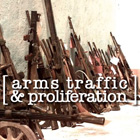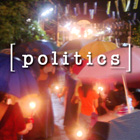
|
UK TREASURY TO CLOSE ARMS SALES OFFICE ACCUSED OF CORRUPTION
ALLEGATIONS 'DESO' IS BURDEN TO TAXPAYERS, USED TO ENRICH GIANT ARMS MANUFACTURERS, FACILITATE SALES TO 'QUESTIONABLE' REGIMES 10 July 2007 The British Treasury department has announced plans to close the government's controversial office for arms sales, amid allegations of corruption in dealings with foreign governments and fears of proliferation. According to the Guardian, "The 450-strong defence export services organisation (Deso), based near Oxford Street in London, has long been the target of anti-corruption campaigners and opponents of the arms trade." The former Treasury cabinet minister had initiated plans to disband Deso, alleging that it was subsidizing highly profitable private defense firms like BAE. The section of Treasury dedicated to industrial productivity has found the arms sales office to be "anachronistic" and an unnecessary burden on the taxpayer. Treasury also found that the office had gainted too much influence over executive policy at Whitehall. Rob Evans and David Leigh, writing for the Guardian report "Deso, set up in 1966 when the arms industry was largely state-owned and was mainly concerned with selling off surplus equipment, spends £15m a year directly on helping British arms firms to sell equipment abroad. It also lobbies within Whitehall for export licences for sales to sometimes controversial regimes." One case under scrutiny is the authorization given by Deso for BAE to pay £1 billion to Prince Bandar of Saudi Arabia, an apparent commission on arms sales to that country. Deso runs a special arms sale for British firms selling to Saudi Arabia, known as Al Yamamah, on which it takes a 2% commission. Deso argues such marketing campaigns and arms fairs help reduce the cost of arms bought by UK forces, but Treasury found the opposite was true in at least some cases, and that there was no evidence of any cost reduction. The US Department of Justice is now investigating the Saudi-linked arms deals, after outgoing PM Tony Blair froze investigations on the grounds of "national security". The report by UK Treasury finds that the reputation of the British government is harmed by "promoting arms exports to countries with severe developmental shortcomings and/or human rights concerns (such as China, Colombia, India, Indonesia, Pakistan and Saudi Arabia". [s]
NORTH KOREAN DENUCLEARIZATION COULD LEAD TO LASTING PEACE Reuters and the Wall Street Journal are reporting that US negotiations to achieve the de-nuclearization of North Korea may also lead to talks to officially end the 1950-1953 Korean war, which has been officially in a state of truce (at times fragile) since 1953. State Dept. negotiator Christopher Hill has said the 6-party regional talks could become comprehensive peace talks, with the aim of declaring an official end to the war by year's end. [Full Story] UN SMALL ARMS CONFERENCE SEEKS GLOBAL REGULATIONS The United Nations conference on light weapons proliferation is facing a burgeoning black market trade which spreads new and used small arms around the globe, fueling civil wars and organized crime. Recent months have seen a number of reports urging governments to tackle the problem; in May, the rights group Amnesty International reported the illicit trade was "out of control", fueled by an "opaque chain" of private interests. [Full Story] UGANDA TO DESTROY 57,000 WEAPONS The nation of Uganda is taking important steps toward reducing the risk of regional arms poliferation, by destroying a stockpile of old and out-of-use weapons and weapons seized from illegal sources. The move is part of Uganda's pledge to the 2004 Nairobi Protocol, which required signatory nations of Africa's Great Lakes region to reduce the threat of proliferation of light arms across borders, to the peril of civilian populations and political stability. [Full Story] AMNESTY REPORTS INTERNATIONAL ARMS TRADE 'OUT OF CONTROL' Amnesty International has published a new report examining the international arms trade, and its findings indicate there is little control on the expanding web of private interests seeking to profit from a proliferation of dangerous weapons. The report also illustrates the ways in which this scattering of dangerous weapons has lead to severe human rights abuses. [Full Story] 'TREE OF LIFE' MAKES USED WEAPONS INTO SIGN OF HOPE In the wake of Mozambique's long civil war, lasting from 1976 to 1992, a group of artists set up the Transforming Arms into Tools project in the nation's capital, Maputo. Sculptors use decomissioned weapons, and parts of weapons to make art, expressing the possibility of finding new ways to secure and advance civil society. [Full Story] |
||||||
|
|||||||

